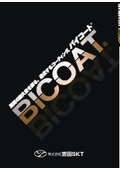What is a method to reduce the release resistance of the ejector pin? Countermeasures through surface treatment.
Solve ejector pin troubles with surface treatment technology! Easy demolding even with soft resins that are less likely to stick.
■What is an ejector pin? Also known as a push-out pin, it is a pin incorporated into a mold to push out and remove molded products from the mold. Ejector pins are used in most injection molding molds and come in various shapes, materials, and sizes. It is important to choose the appropriate pin for demolding based on combinations of shapes such as round pins, square pins, and middle flange pins, as well as materials like SKD-61 and SKH-51. ■Methods to reduce the demolding resistance of ejector pins To reduce the demolding resistance of ejector pins, methods include mold design, pin arrangement and shape selection, and reviewing molding conditions. However, in cases of materials that tend to stick or soft resins, sticking can lead to demolding failures. In such cases, it is necessary to consider utilizing surface treatment technologies. ■Surface treatments to improve the demoldability of ejector pins Ejector pins need to protrude from the mold, so they require not only demoldability but also wear resistance and dimensional stability. Yoshida SKT's Bicoat has a proven track record of achieving smooth demolding when applied to ejector pins. For more details on Bicoat, please download the catalog and check.
basic information
In the molding process, there was a request to shorten the molding time to accommodate increased production. When attempting to demold the resin from the mold in a shorter time than usual, a problem occurred where the resin had not yet sufficiently hardened, causing the ejector pins to get stuck and unable to be removed. As a result, a coating to improve the demolding of the resin was considered. "Bycoat" has excellent release properties and allows for smooth demolding even with soft resin without sticking. It also offers good dimensional accuracy, making it suitable for coatings on items with strict dimensional tolerances like molds. Furthermore, its high hardness allows it to be used in environments with high pressure, similar to molds, successfully improving production efficiency and increasing the output of parts. *Please refer to the booklet for case studies. Feel free to contact us with any inquiries.*
Price range
Delivery Time
Applications/Examples of results
For more details, please refer to the leaflet. Feel free to contact us as well.
Related Videos
catalog(2)
Download All CatalogsNews about this product(1)
Recommended products
Distributors
To maximize the performance of manufacturing equipment and machine parts, Yoshida SKT derives the "optimal solution" tailored to our customers from hundreds of surface treatment technologies. - Decreased productivity due to adhesive troubles - Instability in product quality due to friction - Early deterioration of equipment due to corrosion We respond to these challenges in the manufacturing field with our extensive track record and reliable technical expertise. In 1963, we began fluoropolymer processing. In 1968, we signed a licensing agreement with DuPont (now Chemours), supporting manufacturing innovations for over 2,000 customers across various industries, from automotive to medical and aerospace. Furthermore, in 2024, we are focusing on the development of next-generation products, such as PFAS-free coatings, contributing to the advancement of sustainable manufacturing. With a three-base system in Nagoya, Tokyo, and Yamaguchi, we flexibly respond to both mass production and custom orders. Our consistent quality management system ensures that we deliver reliable quality. For solving challenges in the manufacturing field, trust the surface treatment experts at Yoshida SKT.








































